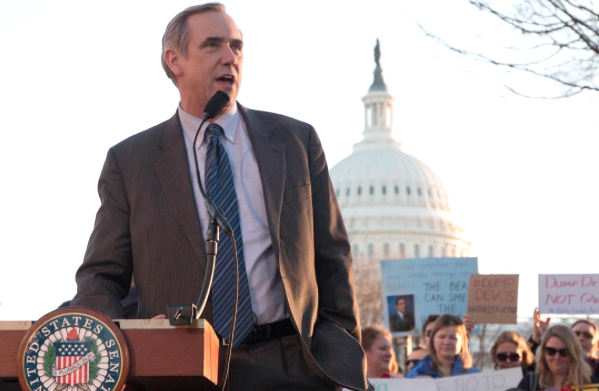
Ask President to Respond to Sen. Merkley’s
Urgent Message on Climate Crisis
RootsAction
(August 7, 2023) — Senator Jeff Merkley of Oregon has given a powerful interview to the Washington Post on what’s needed to address the climate crisis, why it’s needed immediately, and what the Biden administration could be doing but isn’t. [A transcript of the interview follows — EAW]
Here’s some of what Sen. Merkley said: “The Biden administration has reverted to an all-of-the-above strategy. They are green-lighting one fossil project after another, more drilling in the Gulf of Mexico, a new LNG export facility in Alaska, a massive North Sea drilling operation called the Willow Project, the Mountain Valley Gas Pipeline. And they’ve failed to absolutely educate Americans about the immediacy of the challenge and how dramatically we need to operate in order to take it on.” More here.

ACTION: Let’s Ask President Biden to Respond
Click here to email President Biden
THE LETTER (PS: It helps to add your own words)
Dear Joe Biden:
Storms are knocking on our doors — and knocking down our homes.
Wildfires are consuming our forests and destroying millions of legacy redwoods and sequoias.
Vast stretches of demolished neighborhoods mark the path of destructive and deadly tornados with damage on a scale that resembles a battlefield.
The fact is, the US — and the entire planet — is under the assault of Extreme Weather caused by corporate pollution fueled by corporate greed.
We need to stop promoting foreign wars and start spending the country’s wealth on domestic self-preservation. We need to lay down our arms — and our fuel pumps — and reinvent the way we live our lives. Or our lives will be among those that are lost.
Transcript: The 118th Congress and Climate
Washington Post Live
(August 1, 2023) — MS. CALDWELL: Hello. Welcome to Washington Post Live. I’m Leigh Ann Caldwell, anchor at Washington Post Live and also co-author of The Early 202 newsletter.
Today I am joined by Oregon Democratic Senator Jeff Merkley. Senator Merkley, thanks so much for joining us today.
SEN. MERKLEY: You’re welcome, Leigh Ann. It’s good to be with you.
- CALDWELL: We have a lot of topics to get to, but I want to start on the issue of climate change. As you fully know and most of our viewers know, this summer has been extremely hot in many places around the country. They have what’s called a “heat dome” that has hovered over the southern part of the country, but in addition, there’s been a lot of weird climate events over the last couple months and beyond. So you have asked, not only just recently but for the last couple of years, for President Biden to declare a climate emergency. What do you mean by that? What would you like to see?
SEN. MERKLEY: Well, certainly, the impact of this summer has been very clear; July 4th, the hottest day in human history; the last nine years, the hottest nine years in human history. And we see all sorts of other impacts in terms of drought and loss of snowpack and stronger storms and ocean acidification. So when you look at that collective impact, this is a global emergency. It’s the biggest threat that humanity has ever faced.
So even before Biden was inaugurated, I was arguing use that first speech to lay out the challenge that the United States has to set the example, have the power of its example, has to work and lead other countries, other countries that have put less carbon into the atmosphere over the last 150 years, other countries that have lower standards of living. We have to have the power of example, lead and help the world take this on.
But instead, what we have seen is the Biden administration has reverted to an all-of-the-above strategy. They are green-lighting one fossil project after another, more drilling in the Gulf of Mexico, a new LNG export facility in Alaska, a massive North Sea drilling operation called the Willow Project, the Mountain Valley Gas Pipeline. And they’ve failed to absolutely educate Americans about the immediacy of the challenge and how dramatically we need to operate in order to take it on.
So while they’ve done many things that I like a great deal, what they haven’t done is be the bold, insightful, determined leader on climate that the United States needs and the world needs. And a climate emergency would, under our laws, declaring it would give the president a lot more powers, which he could exercise as he saw appropriate as issues develop, things like banning oil exports or activating the Defense Production Act.
To meet the goal that Biden laid out for 2035, in terms of all electricity being generated by renewable energy, if half of that comes from solar, then we have to deploy nearly 3 billion solar panels between now and 12 years from now. We’re nowhere close to having the production capacity to do that. I mean, we’re not even–we’re not even a tiny bit of the way there.
So there’s more that the president could do. They could–he could shift funds with climate emergency to accelerate R&D on batteries. He could accelerate transmission lines needed to interconnect different grids across the country. He could send a message to investors and send a message to universities and send a message to the public that he is going to fight this battle as fiercely or more fiercely than, say, President Trump continuously fought and raised issues about our southern border.
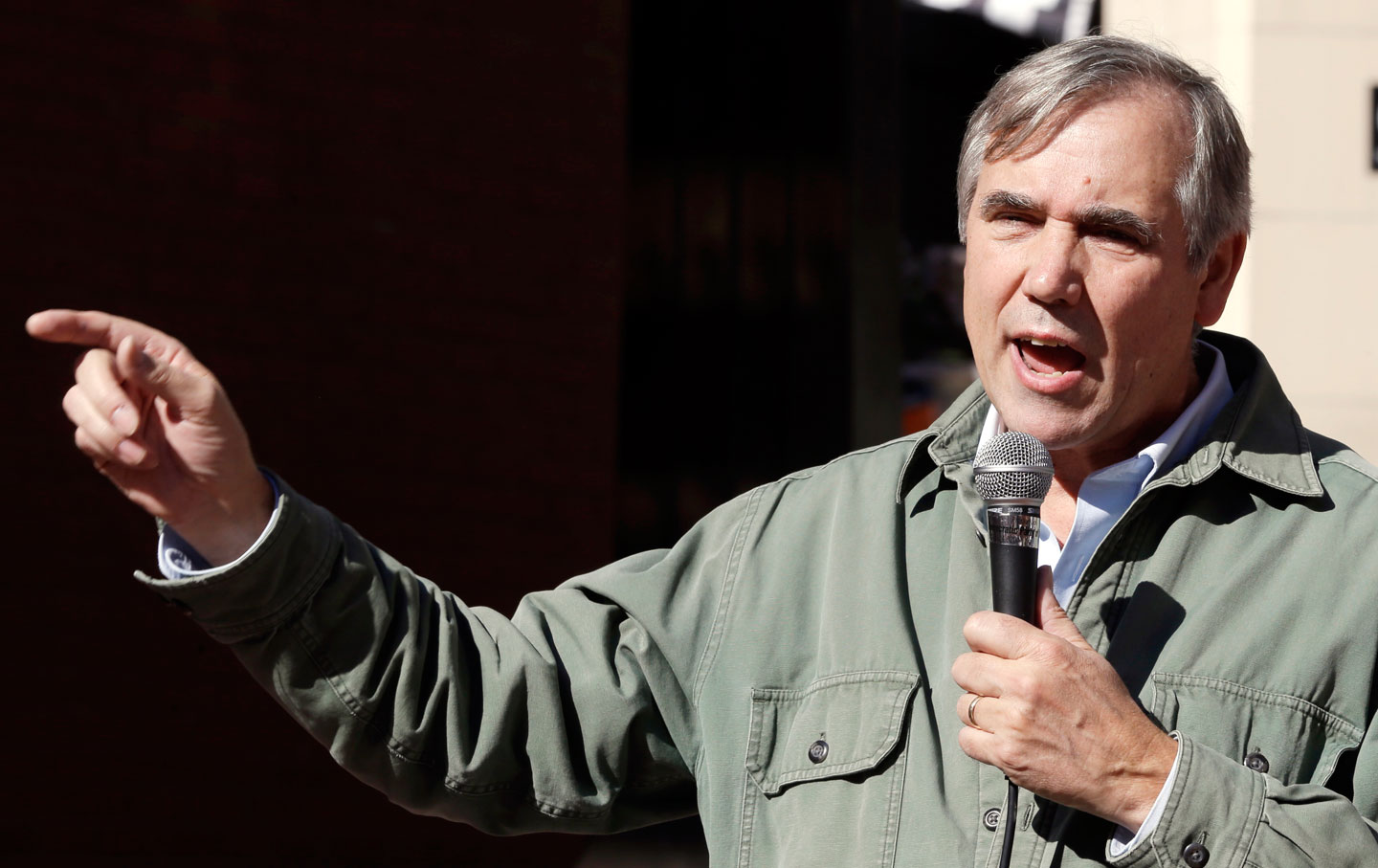
- CALDWELL: Yeah. So what does the White House, what does the administration say to you when you ask why they’re not doing this or when they respond to your letters, if they respond, about this issue?
SEN. MERKLEY: Yes. They give very vague answers like you understand why we have to follow the course we’re following, and I will say, no, I do not understand. Yes, I realize the Senate is split in the last session of Congress 50-50. Now it’s 51-49. I understand that producing bills that will be helpful require essentially every Democrat to be on board. I understand this, but I do think that people rally around a leader who lays out a clear and powerful vision and says how urgent it is. And that is more important, more needed than a little bit of cooperation that some senator will come in and sit down and talk to you.
So I really think that, quite frankly, President Biden and his team do not understand the level of challenge we’re facing, and that really, President Biden, as one NASA climate scientist said a week ago, he is the last president who can keep the Earth from exceeding 1.5 degrees Centigrade, which we’re hurtling towards just so rapidly.
- CALDWELL: Does President Biden need a primary challenger to push him on this issue?
SEN. MERKLEY: Well, it probably wouldn’t hurt if there was an activist who had a very clear reputation and a solid grassroots connection to be in the campaign to be making these points, but realize President Biden at this point really does have the primary tied up, the major environmental groups endorsed early. They were afraid that a challenger would undermine President Biden the way, say, Ted Kennedy’s campaign damaged Jimmy Carter’s reelection.
So labor is already on board. Reproductive rights groups are on board. Major environmental groups are on board. I think what we’re seeing now is the president has the primary well in hand, but those climate groups that did that early endorsement, they should go back and say, “You don’t want just our endorsement. You want our activists knocking on doors. You want the Sunrise Movement of youth to be passionately excited about your campaign. It is pivot now. Say no to any more fossil project.”
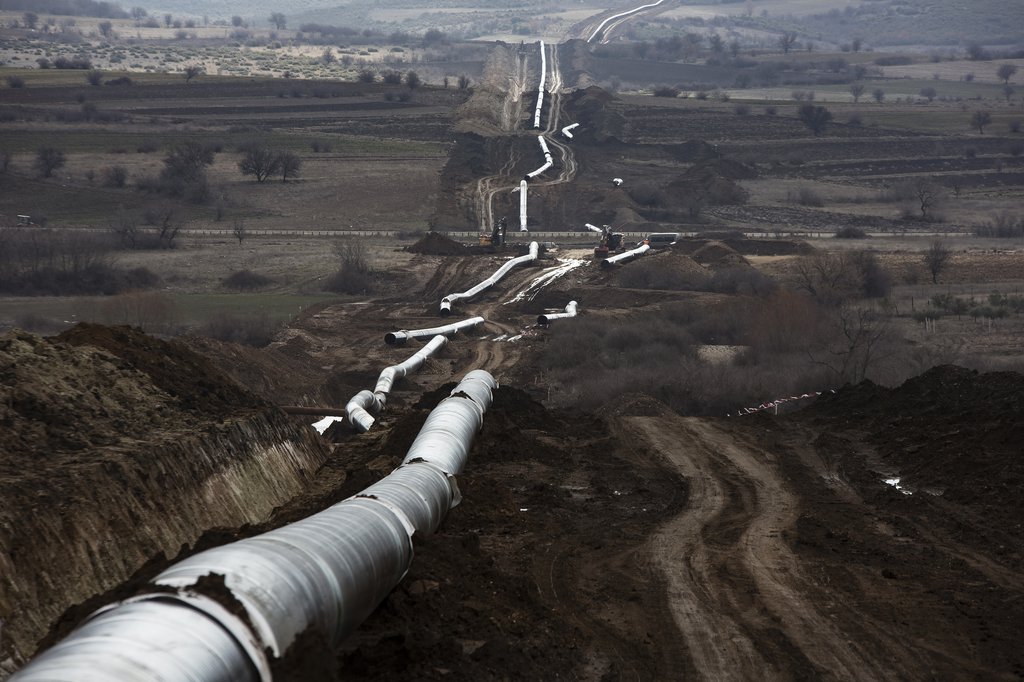
For example, right now, the fossil fuel world wants to double the capacity of a pipeline that runs through Oregon and Washington, and I’ve been working to get FERC to say no because they haven’t demonstrated a, quote, “need” for that additional fossil methane gas in California or Oregon or Washington. And so I’m lobbying the White House.
Well, those environmental groups that have already endorsed him, they should say, “Here’s a great example of making the pivot right now. Do not allow them to double the pressure that pipeline and double that gas.” This is a case where the administration wants to pretend that fossil gas is somehow better for the climate than coal, and that is a fallacy.
A recent study said if a fossil gas, natural gas–but “natural gas” is a marketing term. Let’s call it “fossil methane gas.” If it has a 0.2 percent leakage rate, then it is as bad for the climate as coal. So they’re essentially equivalent or possibly fossil gas is worse because methane, the primary component of fossil gas, is such–so effective at trapping a heat.
So do not pretend that somehow fossil gas is better. Do not pretend that plastics, expansion of plastics is okay, or fossil hydrogen. Those are all things that will be climate killers, and the president has to help educate the United States and again take us back to that core power of our example and then our persuasive ability with other countries.
- CALDWELL: John Kerry was in China recently to talk about–he’s the climate envoy for the administration–to talk about climate change. Did he do enough there? He came back from that trip without much success. Did he do enough to try to move the Chinese on a climate mission?
SEN. MERKLEY: You know, I love John Kerry and the expertise he brings, and he’s just the right person to have in this job. But most of what’s been happening is countries have been setting goals for 2035 and 2050. When earlier this year I was in Vietnam and I was in Indonesia, they bragged about their 2035 goals and 2050 goals. Those goals are just mirages on their horizon. Having countries sign up to that is meaningless.
What matters now is a fast pivot off of fossils. Stop producing more fossil infrastructure. Rapidly deploy renewable infrastructure. The real test of how the world is doing is how much each year does the carbon go up that’s in the atmosphere, and it went up more last year than any year in human history. In other words, we haven’t even begun. We haven’t even started. We haven’t even gotten the slightest start on ending the acceleration of carbon into our atmosphere, and that is so powerfully destructive to the world that our children will see, our grandchildren will see. It will get worse and worse.
I mean, think about how bad it is now compared to 25 years ago. This is going to accelerate to another place. So the kind of agreements that Kerry needs to get are real on-the-ground commitments of changes that immediately stop new fossil projects and accelerate renewables. But how can the U.S. ask for that when we’re approving a whole lot more fossil projects here at home? That is the fatal flaw and the direction that the president is headed. On this most important issue facing humanity, Team Biden is failing.
.jpeg)
- CALDWELL: There’s talk about permitting reform trying to get done this Congress. Some climate activists say that it is necessary to do this permitting reform that will help all energy sectors in order to advance renewable energies. Where do you stand on that?
SEN. MERKLEY: Very dangerous to have permitting reform that proceeds to unleash even faster fossils. Wrong message to the world. Wrong message on the ground here. Yes, we need improvements on electric transmission, interconnecting different parts of the country. Much of that can be done by putting taller towers and wider cuts, if you will, on existing pathways, whether the new pathways. That’s much easier to do. But if you unleash more fossils more quickly, boy, we just undermine everything at home and everything abroad.
Moreover, the House leaders have said they’re not going to talk about permitting reform or transmission reform, which would help with the electricity equation, the grid, unless there’s a massive curtailment of the Clean Water Act. Well, politically, that’s not going to fly. In other words, the Republican Party, the key puppet master of the Republican Party is the fossil fuel community. That is the big challenge we face.
Last year, they had some $300 billion in profits. They put 1 percent of that into the political system as an investment in the campaigns. That’s $3 billion. The Republican Party is controlled by the fossil fuel world, and it’s going to take a clear message from Biden in his reelection that the path that he’s on is serving the American people and the future for our children, our grandchildren, not the short-term profits of the fossil companies. They have to be painted as the bad guy because they are the bad guy. They are the force that is determined to keep on a path that will–that is destroying our world.

- CALDWELL: Senator, I want to change topics. Another issue that you’ve been working on, on Capitol Hill, is TSA facial recognition. As more record-level travel for some Americans this summer, more and more airports are using this facial recognition mechanism through the TSA process. What are your concerns about it?
SEN. MERKLEY: Well, I’m very concerned about a government creating a surveillance state where they track Americans everywhere you go, and what the TSA had in their 2018 plan was, hey, we want to experiment with this and have an opt-in option, an individual in line could choose instead of having their face identified by the TSA agent, to have the camera identify them. But they have gone from opt in to opt out, and in fact, they really have opt-out. What they have done is the agent directs you in front of the camera, but they have no sign in the line as you approach saying, hey, you will have an option, and you don’t have to have the camera.
They don’t tell you. They don’t have a sign at the kiosk. They don’t have a sign under the camera in the four last times I’ve gone through Reagan National, each time I’ve posted about it, and I’ve documented the lack of that signage on my last trip, last Friday. They had no sign in line, no sign at the kiosk, no sign on the camera. What they did have was a sign that had been turned sideways and squeezed in between two kiosks so that nobody could read it, and if you did read it, it wouldn’t say facial recognition, and it wouldn’t say you have a choice. Somewhere way down this fine print there is an indication that you can opt out. You can volunteer to opt out, but of course, no one’s being–it’s just the complete system is set up to force you.
When I have said to an agent, “This is not required, and you’re supposed to inform people that this is an option,” they’ve said, “No, we’re not.” And when I have said, “Well, I’m choosing not to be in front of the camera,” and I hand them my driver’s license, I’ve had an agent say to me, “Well, you’re going to hold up yourself and the entire line,” which was simply not true. It takes like four seconds for the agent to look at your face and look at your card.
On the second-to-my-last trip, the agent had seen that I was taking pictures of what they were doing, which is totally legal, by the way–and I wanted to protect myself and make sure I wasn’t going to get arrested–the agent had me stand aside. And you can hear him on tape saying, “What are we going to do about him?” And, I mean, they absolutely are at the front end of setting up a surveillance state. We should all be extremely worried about it. TSA is not honoring the opt-in strategy. They are not honoring what they have said as they were informing people to opt out. They clearly are on a path that we should all be concerned about.
- CALDWELL: What do they do with that information? Do you know?
SEN. MERKLEY: So they–information initially is simply used for the computer to say does the license, which is being scanned simultaneously by the agent, match the picture just taken, but then they have basically said they’re holding that information and they say temporarily to do a study. Well, what does temporarily mean? Where are they holding this?
You know, they’ve been hacked before, and they’ve lost thousands and thousands of pictures. Maybe the term is “hundreds of thousands.” I don’t have the number in front of me, but the situation of being tracked everywhere you go in in America, it’s just too tempting. I mean, they are going to connect this system up in time to a database of folks that they have an interest in, and that means it won’t just be to connect your face to your driver’s license.
This is the first step. Then they connect it to the database. They say, well, now we can catch people wherever they go, people we’re looking for. And it’s tempting. It sounds like criminal justice will be enhanced. Maybe you’ll catch somebody who has a warrant on them. Do we want a government with the huge powers to track us everywhere we go? What is the cost in privacy? What is the cost in freedom?
We see around the world the advanced surveillance state like China is exercising with the Uyghurs. We do not want to live — I don’t want to live, and I don’t think Americans want to live–in that freedom-constrained environment. So we have to stop it now.
- CALDWELL: Really quickly before I move on to another topic, is this something that could be added, some more oversight could be added to the upcoming FISA reauthorization bill, or is it too different of an issue?
SEN. MERKLEY: Well, under the structure of the Senate, you can add any topic into any bill as long as you can get unanimous consent to have the amendment considered, and that is a change in the Senate that is a big problem. The first Senate, I saw any person, any Senator could raise any amendment on any topic and without unanimous consent, just the–it wasn’t the rules changing. It was the social contract. The social contract was you don’t object to my amendment; I don’t object to your amendment. There was no camera on the floor. The amendments were generally on the topic of the bill. That was the superpower of the Senator. That is completely gone.
Now you need unanimous consent because the social contract has changed. I will object to your amendment because you’re going to object my amendment, and the amendment tree is filled by the leader. So there is no non-unanimous consent option to get your amendment heard. It sounds like insider baseball, essentially what amounts to this. You can’t challenge the powerful nearly as easily as you could a couple decades ago, because you could put–you saw some wrongdoing. You could put up an amendment and force a vote. That vote is recorded. It creates accountability with the American public, but that ability is gone. It’s why you can’t put up a strong amendment on climate because the Republicans will object to the consideration of it.
They just objected. I just had an amendment on the Defense Authorization to end oil exports to China, and the Republicans went bananas over it and, of course, objected to it being voted on.
So I do believe this, though, to your point, Leigh Ann, that is there’s support among Democrats and Republicans on this issue. My partner in committee this last week was John Kennedy from Louisiana, a staunch Republican. I’m going to find other Republicans to team up. I’ve talked to Senator Cruz. I’ve talked to Senator Lee. They are considering weighing in on this privacy with the surveillance issue. I think we can build a coalition of Democrats and Republicans who say, “This is dangerous. This is not a path we want to go down.”
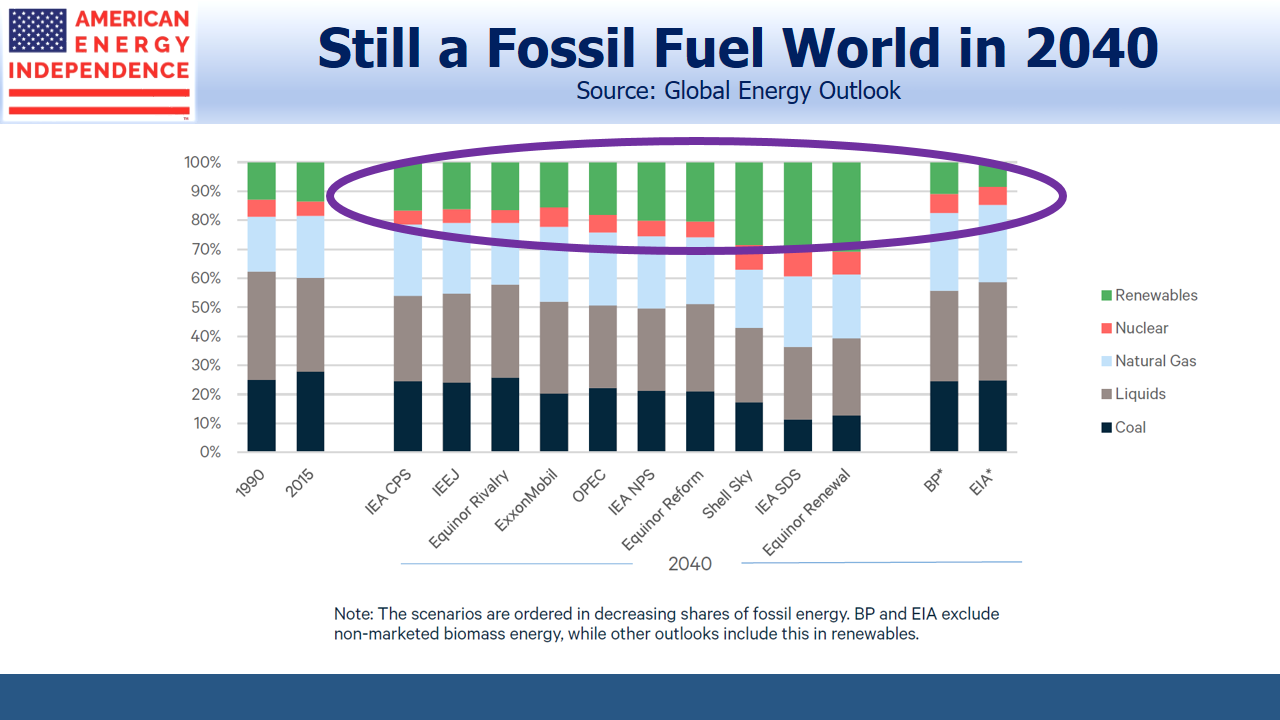
- CALDWELL: Since you brought up Senate procedure, I do want to ask about the filibuster. This is something that you have wanted reform of the 60-vote threshold in the Senate for a while. There was a lot of talk about it in the last Congress when it was 50-50 Senate. There’s not so much talk about it now. Why not?
SEN. MERKLEY: The driving force in the last Congress was Senate Bill No. 1, the For the People Act, my bill, which took on gerrymandering. It took on dark money, and it defended the registration process and the balloting process for every American, defended the ballot box. This was so needed. We had 50 votes and the vice president to support the bill. We only had 48 votes, however, to go from the secret silent veto, where the minority–if they have 41 folks who say no to any debate, you can end debate, but no debate required, the big irony there, to go to a talking filibuster, which we would have been able eventually to get to a vote.
It probably would have taken five or six weeks, but the Senate from its beginning had rules that said eventually after you’ve had a full opportunity to have your say, a vote will be held. It allows you to speak twice to a specific motion within the same legislative day, and a legislative day, if it’s a continuous debate, can stretch on for weeks. That rule is still in the Senate rules.
But two Senators, Senator Manchin and Senator Sinema, chose to keep the silent, non-accountable veto, which discourages cooperation instead of going to a full talking filibuster, which encourages cooperation, because it takes time and effort for the minority to keep up continuous debate and because the majority can’t afford to have the floor tied up for weeks and weeks. So it encourages negotiation and compromise.
But they chose the veto over the talking filibuster and torpedoed that effort, and now we have no chance of getting such a bill through the House. So there isn’t a key legislative opportunity that is driving the debate over the restoring, if you will the system of the past, the talking filibuster as an instrument to be able to drive compromise and get us to a final vote.
Sen. Merkley presents bill to reach 100% renewable energ by 2050;
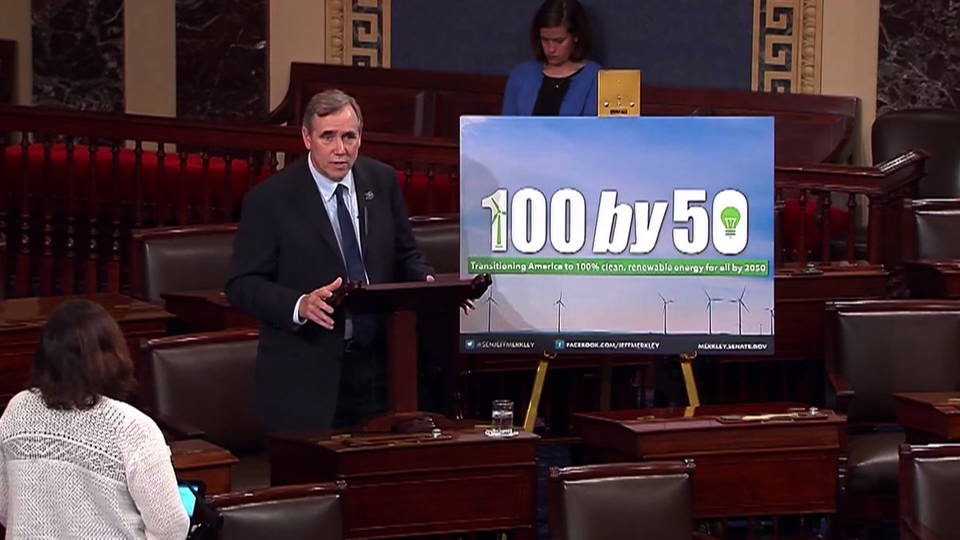
Sen. Merkley presents bill to reach 100% renewable energ by 2050;
- CALDWELL: And finally — we’re almost out of time, Senator — I do want to ask you about an aging Senate. Last week, we saw, you know, the episode by Senate Minority Leader Mitch McConnell. Where he wasn’t–he wasn’t speaking for several seconds and had to be walked away. There’s been questions about Senator Feinstein’s health and her mental capability of serving in the Senate. Does there need to be an age limit in the Senate? Is that something that Congress should discuss?
SEN. MERKLEY: No. I don’t think that has any possibility. It would require a constitutional amendment, and I don’t see that getting the supermajority it needs in both chambers and then three-quarters of the states.
I do say to my team, when I am at that point, that pivot in my life where you start to see the changes in my abilities, don’t let me run for reelection.
But think about Senator Leahy who just retired. He was the last person who was there when I was an intern in 1976. He was the last person–Senator still serving during the time that I’m serving as Senator, and every single week, he was a positive contributor. He brought his humor. He brought his stories about coral reefs bleaching because of his scuba diving. He brought his effectiveness on the Judiciary Committee and the Appropriations Committee. He gave us a real sense of the — how the Senate had changed, and so having a few folks who have been around a significant amount of time can help give insight that newcomers will take a long time to acquire.
I just don’t think America wants to say age as a single factor, but if your–if your health is questionable, if your mind is not as sharp as it was 30 years earlier, then maybe it’s time to think about not running for reelection.
- CALDWELL: Senator, we are out of time. Thank you so much for spending 25 minutes with us this morning. I really appreciate it, with this fascinating discussion.
SEN. MERKLEY: You’re so welcome, Leigh Ann. Let’s go and build a better world.
To watch all of our future programs, please visit WashingtonPostLive.com.
Posted in accordance with Title 17, Section 107, US Code, for noncommercial, educational purposes.
